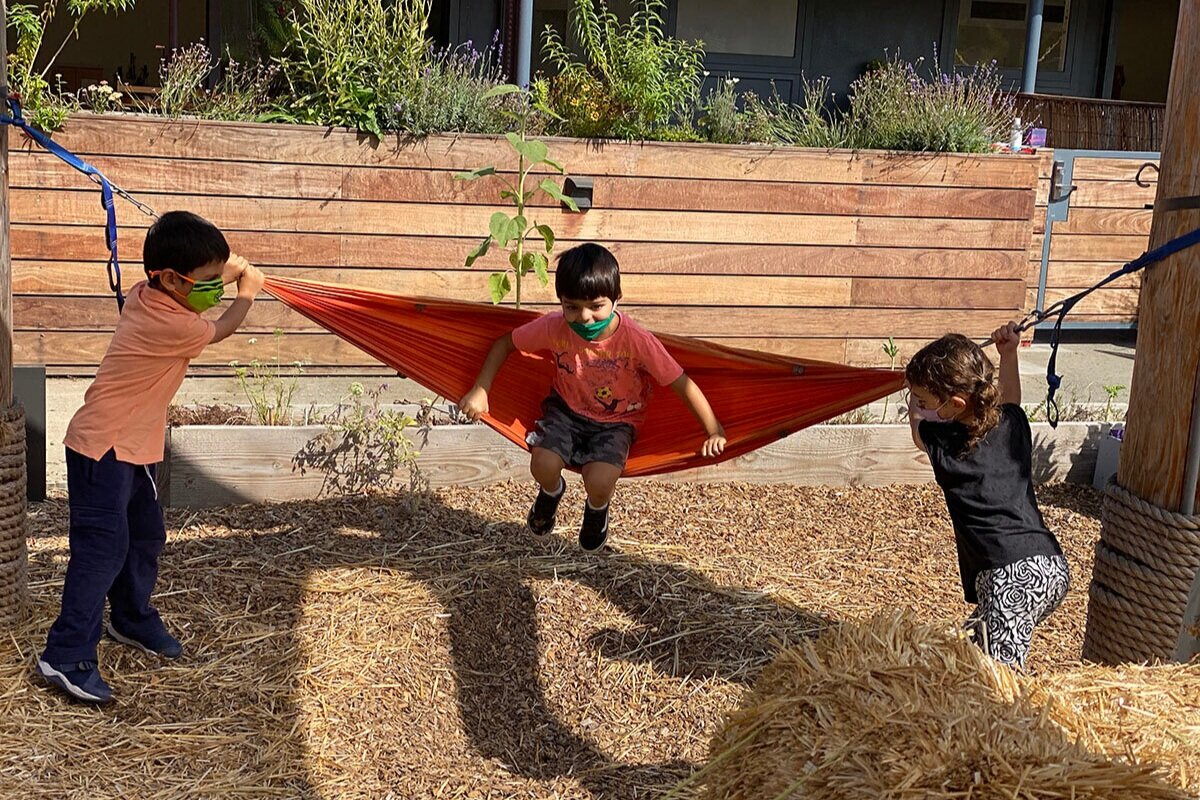Experiencing Nature Supports
Social-emotional Health and Well-being
Passive and active engagement in nature supports children’s social-emotional health and well-being. When schools take their classes and programs outside into environments where nature is present—on their school grounds or in local parks—they are placing students in spaces that support their social-emotional health and well-being. Outdoor learning also often includes hands-on curricula, which also supports children’s social interaction skills, confidence building, problem solving, independence, negotiation skills, and creativity.
Unstructured nature play can enhance children’s social and emotional development. Outdoor learning offers positive benefits for children identified with social, emotional, and/or behavioral conditions including increased pro-social behavior and social well-being. Limited opportunities to engage in outdoor learning negatively impact children’s group social play and interaction.
And time matters. Fewer, longer sessions of outdoor learning (education outside the classroom) are more beneficial than more frequent, shorter sessions and lead to improved pro-social behaviors among students.
Blended learning that combines traditional education with forest school or other models of outdoor curricula enhances children’s social interaction skills, builds confidence, promotes problem-solving and independence, builds negotiation skills, and supports creativity. The relationship between teachers and children is more collaborative outdoors, which is further influenced by teachers’ own positive childhood experiences with the outdoors.
Living close to and being in nature can buffer children’s social skills as well as improve pro-social environmental attitudes. High levels of exposure to outdoor green space may improve children’s pro-social behaviors such as cooperating, sharing, and comforting. Children report increased social connectivity and decreased peer conflict after engaging in greened schoolyards. Plus, early experiences with school gardening programs are associated with increased prosocial environmental attitudes.
Engagement in environmental education and increased access to nature-based programs can improve overall health-related quality of life and increase family support among youth who are systemically under-resourced and black, Indigenous, and people of color (BIPOC). Opportunities to engage in education outside the classroom can lead to the inclusion of systemically under-resourced and BIPOC students who may be at risk of exclusion in schoolwork and school life. Among these students, increased education outside the classroom inversely correlates with decreased symptoms of inattention and hyperactivity and adverse peer interactions.
“The green space at our school (Eagle Rock Elementary) gives my students with autism an opportunity to engage in sensory motor activities and further develop their collaborating and communication skills with peers. It also provides my students with a space that they can visit when they are overstimulated and are experiencing high anxiety. Our green space provides peace, comfort, physiological relaxation, and helps reduce their anxiety.”
REFERENCES
Blair, D. (2009). The child in the garden: An evaluative review of the benefits of school gardening. The Journal of Environmental Education [Internet], 40(2), 15–38.
Bølling, M., Niclasen, J., Bentsen P., & Nielsen, G. (2019). Association of education outside the classroom and pupils’ psychosocial well-being: Results from a school year implementation. Journal of School Health, 89, 210-21.
Coates, J.K., & Pimlott-Wilson, H. (2019). Learning while playing: Children's forest school experiences in the UK. British Educational Research Journal, 45(1), 21-40.
Dankiw, K.A., Tsiros, M.D., Baldock, K.L., Kumar, S. (2020). The impacts of unstructured nature play on health in early childhood development: A systematic review. PLoS ONE, 15(2).
Dopko, R.L., Capaldi, C.A. Zelenski, J.M. (2019). The psychological and social benefits of a nature experience for children: A preliminary investigation. Journal of Environmental Psychology, 63, 134-138.
Ekenga, C.C., Sprague, N., & Shobiye, D.M. (2019). Promoting health-related quality of life in minority youth through environmental education and nature contact. Sustainability, 11.
Larrea, I., Muela, A., Nekane, M., & Barandiaran, A. (2019). Children’s social play and affordance availability in preschool outdoor environments. European Early Childhood Education Research Journal, 27(2).
Norwood, M.F., Lakhani, A., Fullagar, S., Maujean, A., Downes, M., Byrne, J., Stewart, A., Barber, B., & Kendall, E. (2019). A narrative and systematic review of the behavioural, cognitive and emotional effects of passive nature exposure on young people: Evidence for prescribing change. Landscape and Urban Planning, 189, 71-79.
Price, A. (2019). Using outdoor learning to augment social and emotional learning (SEL) skills in young people with social, emotional, and behavioural difficulties (SEBD). Journal of Adventure Education and Outdoor Learning, 19(4), 315-328.
Putra, I. G. N. E., Astell-Burt, T., Cliff, D. P., Vella, S. A., John, E. E., & Feng, X. (2020). The relationship between green space and prosocial behaviour among children and adolescents: A systematic review. Frontiers in Psychology, 11, 859.
Volpe, M., Derr, V., & Kim, S. (2019). “And it made me feel good inside”: Initial evidence and future methods for evaluating nature school effectiveness. Children, Youth and Environments, 29(2), 5-26.
Waite, S. (2011) Teaching and learning outside the classroom: personal values, alternative pedagogies and standards. Education, 3-13, 39:1, 65-82.
Credits
This article was written in December 2020 by Mila Antova, PLA, Moody Graham; Karen Canan, parent, groundskeeper, and advocate for outdoor education; Caitlin Koob, OTR/L Student, PhD Program in Applied Research and Evaluation; Abigail Levinson Marks, PhD, Licensed Clinical Psychologist; Marci Raney, PhD, Department of Kinesiology, Occidental College; Amy Wagenfeld, PhD, OTR/L, SCEM, EDAC, FAOTA, Boston University Post-Professional Occupational Therapy Doctoral Program and Amy Wagenfeld | Design.
It was reviewed by Sarah Gill, MPP and Zach Pine, MD, Zach Pine Create with Nature.
National COVID-19 Outdoor Learning Initiative
The National COVID-19 Outdoor Learning Initiative supports schools and districts around the country in their efforts to reopen safely and equitably using outdoor spaces as strategic, cost-effective tools to increase physical distancing capacity onsite and provide access to abundant fresh air. The Initiative seeks to equitably improve learning, mental and physical health, and happiness for children and adults using an affordable, time-tested outdoor approach to keeping schools open during a pandemic.








